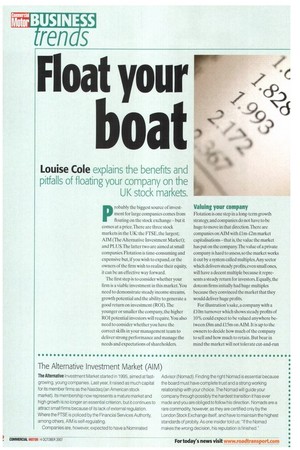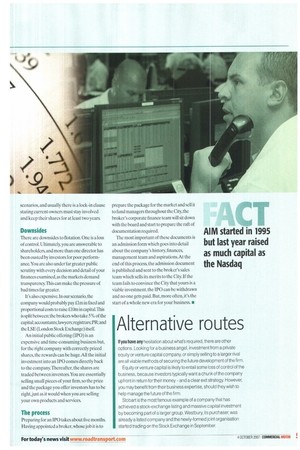Float your FF
Page 52

Page 53

If you've noticed an error in this article please click here to report it so we can fix it.
boat
Louise Cole explains the benefits and pitfalls of floating your company on the UK stock markets.
probably the biggest source of investment for large companies comes from floating on the stock exchange—but it comes at a price.There are three stock markets in the UK: the FTSE, the largest; AIM (The Alternative Investment Market); and PLUS.The latter two are aimed at small companies. Flotation is time-consuming and expensive but, if you wish to expand, or the owners of the firm wish to realise their equity, it can be an effective way forward.
The first step is to consider whether your firm is a viable investment in this market.You need to demonstrate steady income streams, growth potential and the ability to generate a good return on investment (ROI).The younger or smaller the company, the higher ROI potential investors will require. You also need to consider whether you have the correct skills in your management team to deliver strong performance and manage the needs and expectations of shareholders.
Valuing your company
Flotation is one step in a long-term growth strategy, and companies do not have to be huge to move in that direction.There are companies on AIM with £1m-i2m market capitalisations — that is, the value the market has put on the company.The value of a private company is hard to assess, so the market works it out by a system called multiples. Any sector which delivers steady profits, even small ones, will have a decent multiple because it represents a steady return for investors.Equally,the dotcom firms initially had huge multiples because they convinced the market that they would deliver huge profits.
For illustration's sake, a company with a £10m turnover which shows steady profits of 10% could expect to be valued anywhere between £8m and £15m on AIM. It is up to the owners to decide how much of the company to sell and how much to retain. But bear in mind the market will not tolerate cut-and-run scenarios, and usually there is a lock-in clause stating current owners must stay involved and keep their shares for at least two years.
Downsides
There are downsides to flotation. One is a loss of control. Ultimately, you are answerable to shareholders, and more than one director has been ousted by investors for poor performance.You are also under far greater public scrutiny with every decision and detail of your finances examined, as the markets demand transparency.This can make the pressure of bad times far greater.
It's also expensive. In our scenario, the company would probably pay Elm in fixed and proportional costs to raise ElOm in capital.This is split between: the brokers who take 5% of the capital; accountants; lawyers; registrars;PR;and the LSE (London Stock Exchange) itself.
An initial public offering (IPO) is an expensive and time-consuming business but, for the right company with correctly priced shares, the rewards can be huge.All the initial investment into an IPO comes directly back to the company.Thereafter, the shares are traded between investors, You are essentially selling small pieces of your firm, so the price and the package you offer investors has to be right, just as it would when you are selling your own products and services.
The process
Preparing for an IPO takes about five months. Having appointed a broker, whose job it is to prepare the package for the market and sell it to fund managers throughout the City, the broker's corporate finance team will sit down with the board and start to prepare the raft of documentation required.
The most important of these documents is an admission form which goes into detail about the company's history, finances, management team and aspirations. At the end of this process, the admission document is published and sent to the broker's sales team which sells its merits to the City. If the team fails to convince the City that yours is a viable investment, the IPO can be withdrawn and no one gets paid. But, more often, it's the start of a whole new era for your business. •


























































































































































































